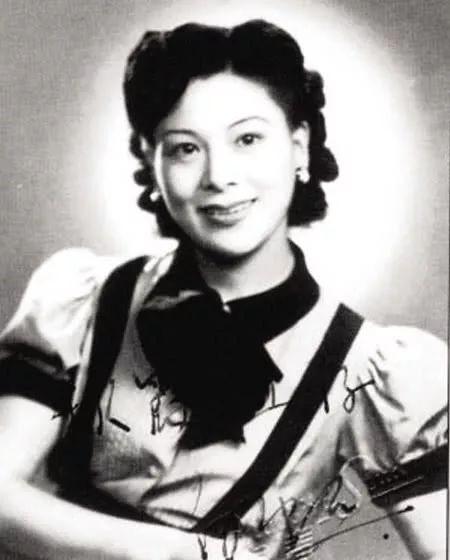(Vientiane History Special Author: Growing Up But Not Adults)
[May 28, 1992] 27 years ago today, China's earliest "supergirl", Bai Hong, died after the song of the anti-Japanese war

Bai Hong, born in Beijing on February 24, 1920, is a Manchurian Yellow Banner native, formerly known as Bai Lizhu.
In 1931 (11 years old), Li Jinhui, the "father of Chinese pop music", as the owner of the Shanghai Mingyue Society Song and Dance Troupe, personally went to Beijing to enroll, and Bai Lizhu, who could sing and dance, was admitted on the spot and went to Shanghai to receive professional song and dance training.
In 1932 (at the age of 12), she recorded her first song, Tuberose. Baihong's singing voice is sweet and natural, delicate and delicate, unique and popular.
(Young White Rainbow)
In 1933 (at the age of 13), she was already a pillar of the Mingyue Society, taking the stage name Baihong, which means "White Rainbow Through the Sun", and the fable name was Anti-Japanese. In the same year, she published records for several companies and officially signed to EMI Records.
The Mingyue Society is an important group in the development of Chinese pop music. In addition to Bai Hong, China's first generation of singers Zhou Xuan, Yan Hua, pop music writers Li Jinguang, Yao Min, and Nie Er are all from the Mingyue Society.
(Bai Hong (center) and Nie Er (right))
From May 26, 1934 (at the age of 14), the entertainment newspaper "Da Wan Bao" on the beach invited the three major singers Bai Hong, the "golden voice" Zhou Xuan and Wang Manjie to take turns to broadcast on the radio. Listeners vote for their favorite singers every day, and finally determine the ranking by the number of votes, which is the first singer contest in the Chinese pop music scene.
The campaign ended on 14 June 1934. In this "SuperGirl Competition", after Bai Hong won the song with 9103 votes, "Golden Voice" Zhou Xuan was the runner-up with 8876 votes. This competition laid the foundation for Bai Hong's unshakable status as a sister in the music world.
In the same year, Bai Hong entered the opera and film industry, starring in song and dance films such as "Fairy on Earth" and "Bodybuilding Sports", and made her debut on the screen.
In 1935 (at the age of 15), Bai Hong led the new song and dance drama "Peanut Rice" of the Mingyue Society, which toured the country. Subsequently, Bai Hong, dressed as a peanut girl, was directly adapted to the film "National Color Tianxiang".
In 1936 (at the age of 16), Bai Hong starred in the new song and dance drama "Peach Blossom Prince" of mingyueshe, toured the Nanyang area, and returned to China a year later.
During this time, she married the composer Lai Kam Kwong. Li Jinguang is the younger brother of Li Jinhui, the "father of Chinese pop music", and is known as the "King of Songs". When Li Jinguang was a teenager, he studied in the Hunan First Normal Cram School, and the class teacher was Mao Zedong.
After marriage, Li Jinguang was responsible for composing, Bai Hong was responsible for singing, and the two were united and became the "golden boy and jade girl" recognized by the opera industry.
In 1938 (at the age of 19), Bai Hong joined the Xinhua Film Company and shot nearly 20 films in 3 years.
In 1939 (at the age of 20), Bai Hong starred in the stage play "Yang Guifei" and the opera "Song of Shanghai". Together with Zhou Xuan and Gong Qiuxia, she called Baidai the "Queen of the Three Great Songs".
(Bai Hong, who plays "Yang Guifei")
In 1941 (at the age of 21), Bai Hong joined the Venus Film Company and starred in several films. The famous song "Salsa Goodbye" was published. "The birds of the morning chirp, as if to say goodbye to Sasha, Sasha loves me, I love her...", everyone sang.
In January 1945 (at the age of 26), Bai Hong held the "White Rainbow Singing Conference" at the Lyceum Theater in Shanghai, singing more than a dozen famous songs such as "Lang is the Spring Wind" and "Haiyan". This is the first pop star in my country to hold a concert.
Over the years, Bai Hong is the most popular song and film amphibious star in Shanghai Beach, starring in a large number of song and dance dramas and movies, and singing famous songs such as "I Want to Go Home", "Suzhou Nocturne", "Midnight Three More" and so on.
(Group photo after the song on the beach, the left one is a white rainbow)
In 1949 (at the age of 30), Bai Hong starred in the movie "Nightingale", and recorded his last record, "Lang Lang Yue / Stabbed Hand".
After the founding of New China, Bai Hong and his wife could no longer perform freely. In 1950 (at the age of 31), the two reported divorce.
Soon after the divorce, Bai Hong married drama actor Mao Yanhua, and the couple joined the Capital Experimental Drama Troupe and performed plays such as "Lin Zexu" and "Mother". Subsequently, she joined the Northwest Military Region Cultural and Labor Troupe and toured for four years.
In 1955 (at the age of 36), the cultural troupe was disbanded, and Bai Hong returned to Beijing and entered the railway troupe. In 1979 (at the age of 60), he officially retired.
On May 28, 1992, Bai Hong died in Beijing at the age of 72.
(The 356th work of the Vientiane History and Biography Writing Camp, and the 5th work of the camper "Growing Up")